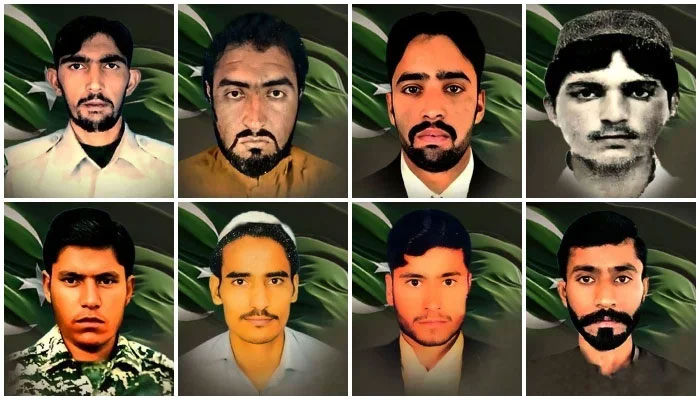Terror continues
Deaths due to militant attacks have now soared well past 1000 mark
On the night of December 20 and 21, another 16 brave lives were martyred in Pakistan’s seemingly never-ending war on terror. A group of TTP members (Khawari) attempted to attack a security forces check-post in the general area Makeen, South Waziristan district, leading to an exchange of fire in which 16 soldiers of the Pakistan Army were martyred while eight terrorists were killed. While there can be no doubting the resolve of the country’s security forces, it is becoming increasingly clear that the fight against terrorism is heading in the wrong direction. Pakistan Institute for Conflict and Security Studies (PICSS) data shows that total militant attacks have risen from 645 in 2023 to 856 this year, an over 32 per cent rise, not counting the month of December. Deaths due to militant attacks have now soared well past the 1000 mark. Balochistan and Khyber Pakhtunkhwa have been the most affected, with the latter also experiencing deadly tribal clashes in the Kurram district that have claimed over a hundred lives.
This level of terror and instability are simply unsustainable and the country needs to urgently fine-tune its anti-terror strategy in order to restore peace and safety. This will be hard to achieve without a broad-based political consensus and a security atmosphere where one does not have to worry about the capital being under siege every few weeks. Sadly, these are exactly the things that the country appears to be short of right now. Pakistan’s political crisis continues to linger with seemingly no end in sight and the chief minister of the province most affected by terrorism is busier planning protests against the very government he needs to be working with to solve the terror problem. But the political fracas is more of a recent development, beginning with the fall of the PTI government in 2022 and reaching its current intensity after the events of May 9, 2023.
Pakistan’s ongoing terror resurgence predates these events by almost, going back to the US withdrawal from Afghanistan in 2021. The US departure appears to have resulted in anti-Pakistan terror outfits like the TTP being able to find a safe haven in neighbouring Afghanistan, increasing their ability to menace Pakistan. The PTI government’s reconciliatory approach towards militants during its tenure also did not help. It is hoped that current and future governments will now finally close the book on that failed tactic and that more will be done to convince the interim-Afghan Taliban government in Afghanistan to counter the presence of anti-Pakistan terrorists on their soil. Other long-term issues that need to be addressed include the preparedness of Pakistan’s police to deal with terror threats. While this is something that is not expected of police in most countries, Pakistan’s unique situation demands otherwise. The police are the first line of defence against the terror threat and they cannot continue to be as underfunded, undertrained and under equipped as they still are. Pakistan has beaten back the terror threat before but both regional and local developments have gone in an unfavourable direction and caused a setback. While things are not as bad as they were ten years ago, the current terror resurgence needs to be ended well before that even becomes a possibility.
-
 Inside Dylan Efron's First 'awful' Date With Girlfriend Courtney King
Inside Dylan Efron's First 'awful' Date With Girlfriend Courtney King -
 'Sugar' Season 2: Colin Farrell Explains What Lies Ahead After THAT Plot Twist
'Sugar' Season 2: Colin Farrell Explains What Lies Ahead After THAT Plot Twist -
 ‘Revolting’ Sarah Ferguson Crosses One Line That’s Sealed Her Fate As Well As Andrew Mountbatten-Windsor’s
‘Revolting’ Sarah Ferguson Crosses One Line That’s Sealed Her Fate As Well As Andrew Mountbatten-Windsor’s -
 AI Rivalry Heats Up As Anthropic Targets OpenAI In Super Bowl Ad
AI Rivalry Heats Up As Anthropic Targets OpenAI In Super Bowl Ad -
 Kate Middleton, Prince William Share Message Ahead Of Major Clash
Kate Middleton, Prince William Share Message Ahead Of Major Clash -
 Is Dark Matter Real? New Theory Proposes It Could Be Gravity Behaving Strangely
Is Dark Matter Real? New Theory Proposes It Could Be Gravity Behaving Strangely -
 Viral AI Caricature Trend: Is Your Personal Data Really Safe?
Viral AI Caricature Trend: Is Your Personal Data Really Safe? -
 Lil Jon’s Late Son, Nathan Smith Spoke Highly Of His Father Before His Tragic Death
Lil Jon’s Late Son, Nathan Smith Spoke Highly Of His Father Before His Tragic Death -
 China Boosts Reusable Spacecraft Capabilities By Launching For The Fourth Time
China Boosts Reusable Spacecraft Capabilities By Launching For The Fourth Time -
 Bianca Censori On Achieving 'visibility Without Speech': 'I Don't Want To Brag'
Bianca Censori On Achieving 'visibility Without Speech': 'I Don't Want To Brag' -
 'Concerned' Prince Harry Future Plans For Lilibet, Archie Exposed
'Concerned' Prince Harry Future Plans For Lilibet, Archie Exposed -
 Skipping Breakfast? Here Are Some Reasons Why You Shouldn't
Skipping Breakfast? Here Are Some Reasons Why You Shouldn't -
 Billie Eilish Slammed For Making Political Speech At Grammys
Billie Eilish Slammed For Making Political Speech At Grammys -
 Beverley Callard Announces Her Cancer Diagnosis: 'Quite Nervous'
Beverley Callard Announces Her Cancer Diagnosis: 'Quite Nervous' -
 WhatsApp May Add Instagram Style Close Friends For Status Updates
WhatsApp May Add Instagram Style Close Friends For Status Updates -
 Winter Olympics Officially Open In Milan, Cortina With Historic Dual Cauldron Lighting
Winter Olympics Officially Open In Milan, Cortina With Historic Dual Cauldron Lighting




